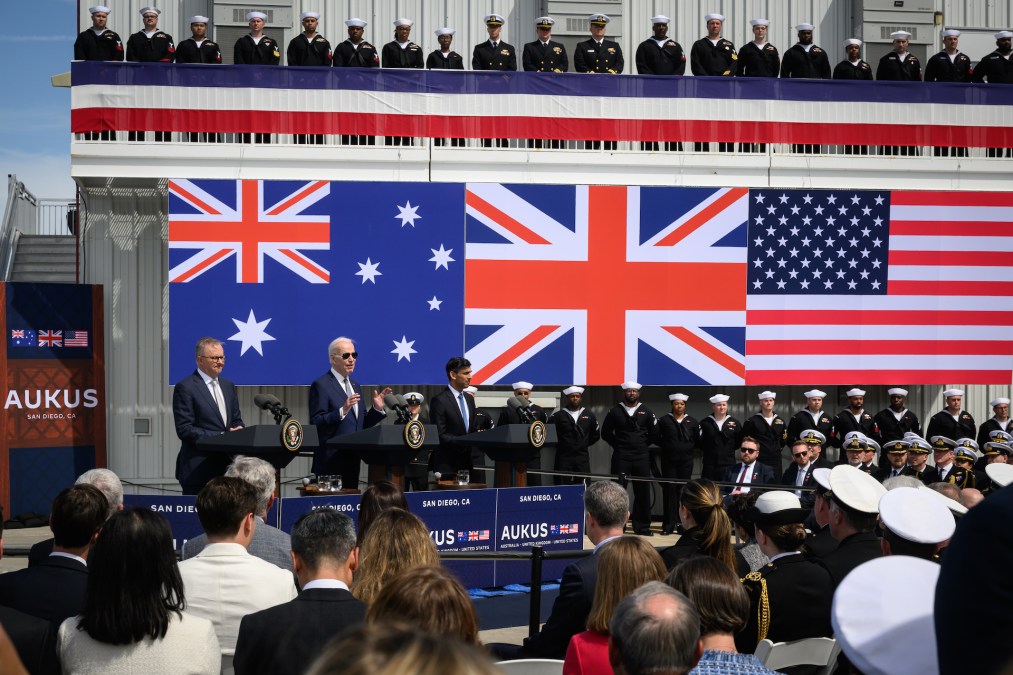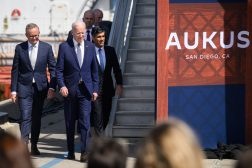Biden administration pursuing legislative changes, ‘sprint teams’ to stimulate AUKUS defense tech

The Biden administration wants help from Congress and its own internal “sprint teams” to boost military cooperation with its Australian and British partners that are part of the AUKUS alliance with the United States.
The AUKUS initiative, which kicked off in 2021, is focused on improving information sharing; integrating industrial bases and supply chains; and spurring technology advancements in undersea capabilities, quantum, artificial intelligence, cyber, hypersonics and other categories.
“Connecting advanced defense research and development communities within three technologically advanced nations … poses real opportunities for global security. We are proposing bold interim measures and simultaneously seeking legislative change to achieve the goal of a dramatic increase in technology sharing between the AUKUS partners. Our top priority is to create new and open ways to share information and technology between the United States, Australia, and the United Kingdom,” Assistant Secretary of State for Political-Military Affairs Jessica Lewis said in testimony to the House Committee on Foreign Affairs on Wednesday.
However, there are obstacles to such cooperation, officials say.
“Our discussions with AUKUS partners have provided a lens into not only what military capabilities our closest allies need, but also what barriers exist which hamper pursuit of our integrated security strategy — and how we need to adapt our approach to meet our national security objectives. We are closely aligned with the State Department on this, and working together collaboratively to pursue novel, rapid, and open ways of enhancing defense cooperation through AUKUS,” Assistant Secretary of Defense for Strategy, Plans, and Capabilities Mara Karlin said in testimony to the committee.
Secretary of Defense Lloyd Austin has directed Pentagon officials to create a series of “sprint teams” aimed at facilitating “seamless and secure information sharing and capability cooperation with AUKUS partners,” according to Karlin.
“As we identify opportunities to streamline our processes, we commit to sharing the results with Congress,” she said.
But the Biden administration also wants help from lawmakers through legislation that would enable more transfers of both unclassified and classified defense articles and services among AUKUS partners.
“We will seek legislative change that would clear a path to new exemptions to licensing requirements for much of our defense trade with the U.K. and Australia. Under this legislative proposal, AUKUS partners will have many transfers pre-approved and not subject to case-by-case reviews. This approach is critical to ensuring the AUKUS partnership continues to innovate and progress to meet the challenges of the global security environment,” Lewis said.
The administration also seeks “a blanket exemption” for third-party transfers within AUKUS.
“What that means is for items that are U.S. defense articles that are controlled by one country, that they can be moved to another country within AUKUS without needing authorization,” Lewis explained.
U.S. agencies also plan to partner with Australia and the U.K. on enhancing trilateral standards for what Karlin described as “secure defense trade.”
Lewis added: “The administration will also be seeking commitments from our AUKUS partners on shared standards for the protection of defense information and materials consistent with the steps the United States takes to protect such information and materials. By increasing confidence in our trilateral security frameworks, we seek to facilitate unprecedented integration and responsible streamlining of our export control laws, regulations, processes, and policies.”
Meanwhile, the State Department will implement what Lewis described as a novel use of existing authorities, through an AUKUS “trade authorization mechanism,” that is envisioned as an “interim solution” to facilitating tech sharing.
“We have begun our engagement with the Committee on this interim mechanism and will continue to consult closely with Congress as we finalize our approach,” she said.
Committee Chairman Rep. Michael McCaul, R-Texas, indicated that he’s open to changes in how the U.S. handles defense trade.
“For this trilateral partnership to succeed, we must reform prohibitive policies and complicated arms export rules as soon as possible through bipartisan legislation … And we will obviously consult with our Armed Services Committee colleagues as well,” he said at Wednesday’s hearing.
Meanwhile, for fiscal 2024, the Pentagon is requesting $25 million for a new-start program to drive the development of underwater drones, artificial intelligence and other emerging technologies for operations associated with AUKUS.
The funding for the new AUKUS Innovation Initiatives is intended to accelerate tech deployments.
“This program provides funding to pursue operationally relevant advanced capability co-development, support integration of multi-national capabilities to act as a force multiplier, and test and evaluate promising solutions found across the AUKUS innovation ecosystem,” according to budget justification documents.
The initiative “will leverage the [DOD’s] most efficient and effective cooperation or acquisition approaches to support the appropriate transition pathway,” per the documents.
Among the five projects, the funding breakdown includes $10 million to develop payloads for unmanned underwater vehicles; $6 million to purchase commercial space data; $5 million to support a new cloud-based AUKUS AI Development Hub; $3 million to conduct a series of engineering and architecture studies supporting the integration of existing and future AUKUS capabilities; and $1 million for a project that will concentrate on enhanced battlespace awareness.
The DOD also anticipates requesting $25 million per year in fiscal 2025-2028 to support those initiatives.






